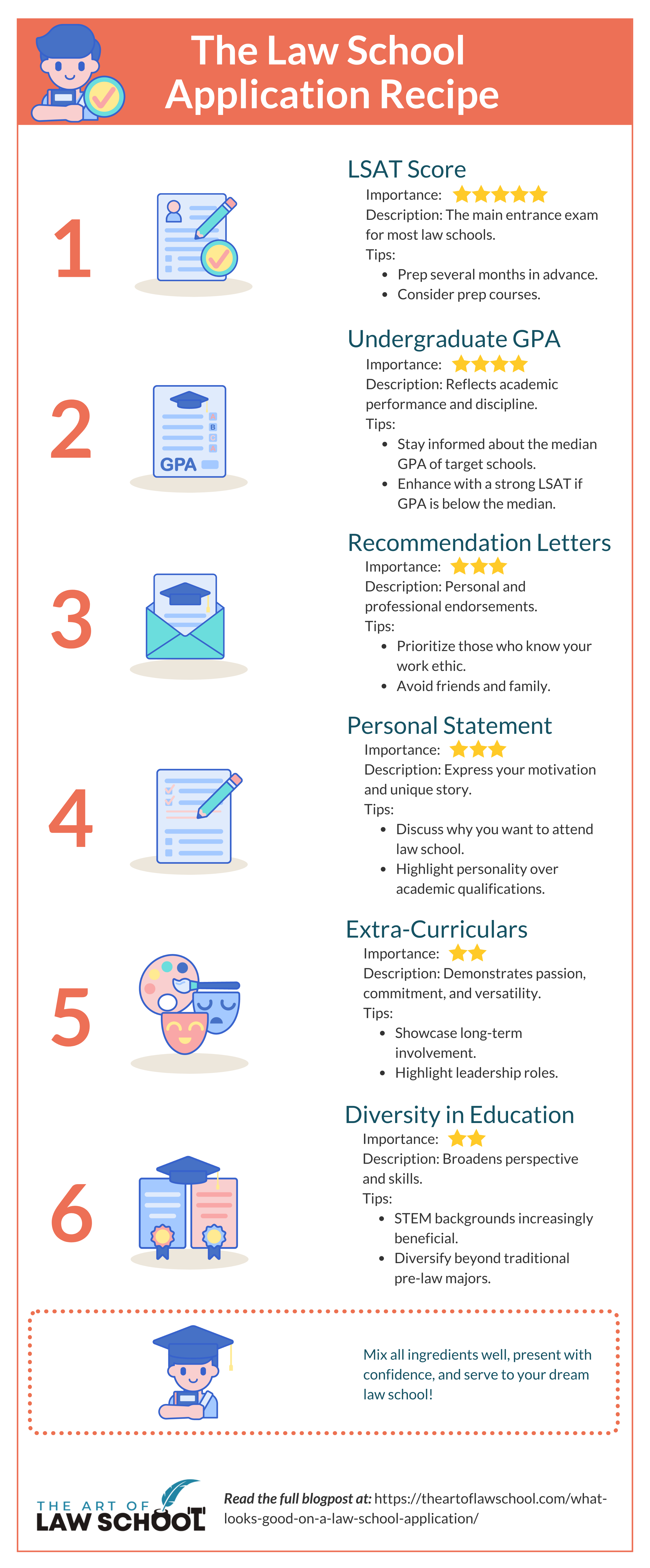Embarking on the journey to law school is both exhilarating and daunting. With the average law school applicant applying to at least five institutions and application costs ranging from $60-$100, it’s evident that this is a significant step in any budding lawyer’s journey. Given the substantial time, effort, and financial investment you’re committing, it’s crucial to ensure every aspect of your application shines. But with numerous requirements and fierce competition, how can you make your application truly stand out? Dive into our guide to discover the essential components that make a law school application outstanding.
Jump Ahead To:
Maximizing Your LSAT Score for Law School Admission

There is not a single more important part of your application than your LSAT score. The LSAT is the law school entrance exam and it remains a requirement to gain entry into the vast majority of law schools. In the past couple of years some law schools have loosened up on LSAT score requirements but these schools are few and far between.
What does a “strong LSAT score” even mean? A strong LSAT score is relative to whatever law school you are applying to. Law schools vary significantly in median LSAT score and you should pay very close attention to this when you are applying. The higher your LSAT score is compared to that particular law school’s median LSAT, the greater the chance you will be accepted. The lower your comparative LSAT score, the lower the chance you will be accepted.
To fully prepare for the LSAT you will need several months of preparation. Students frequently purchase preparation courses, which can cost several thousand dollars. All of this time and money might sound like a lot, but the LSAT is so important to admissions committees that US News has an option to divide law school by LSAT score.
You can check out my article here on Tips for a Great LSAT Score.

The Impact of Undergraduate GPA on Law School Acceptance
Your undergraduate GPA is arguably less important than your LSAT score but at the very least it is the second most important part of your law school application. You can find online lists of where law schools are ranked by GPA and LSAT. The higher-ranked law schools in the top twenty or thirty tend to cluster around a 3.8 GPA and above. Below the Tier 1 ranked law schools you will find that median GPAs are all over the place. My recommendation is that you ensure that you are aware of a law school’s median GPA before you apply.
The good news about GPA requirements is that there is no hard and fast rule to them, and if your GPA is below a particular law school’s median threshold you can always make up for it with an above-median LSAT score.
Crafting an Error-Free Law School Application
Attention to detail is an extremely important component of being a junior attorney. It makes sense that law school admissions offices would pay attention to how clean your application is. Having a well-proofread application is not going to get you through the door of an admissions committee but a poorly written application is a fast-track to the “No” pile. Typos will kill an otherwise strong application and send a message that you are not serious about law school. So make sure that you review your application before you hit that send button!
Obtaining Impactful Recommendation Letters for Law School

Most law schools will require that you submit two recommendation letters. Recommendation letters are an opportunity for you to really stand out from other applicants. Think long and hard about who you want to ask to write recommendation letters. A good obvious choice is an attorney that you have worked or interned for in the recent past. Before I began law school, I interned with a district court judge and the local district attorney’s office. These internships paid dividends when it was time to obtain recommendation letters. Stay away from friends or family for these and make sure that you worked closely enough with the person writing your recommendation letter so that they have a good idea of your work ethic and work product.
Writing a Compelling Law School Personal Statement
In my opinion, personal statements are the toughest part about a law school application. Most of the other application materials simply consists of filling in the numbers but the personal statement is not a document that you can whip up in thirty minutes. A well though out personal statement will explain in a concise fashion why you want to attend law school generally and more importantly, why you want to attend a particular law school.
High quality personal statements really come in handy (along with recommendation letters) when you are right on the fence at a particular law school. Admissions committees will typically turn to personal statements and identify ones that stand out from the rest.
A strong personal statement edges away from your academic qualifications and really hones in on your personality. If your curious about additional guidelines and examples of strong personal statements, check out this article here.
Demonstrating Genuine Interest in Law: Beyond the Grades
A demonstrated interest in the law is another one of those soft factors that admissions committees consider. There is no specific document or application component that you will submit to showcase this but it is something that will hopefully appear due to your demonstrated experience, whether that be internships or working in the legal field, or in your personal statement.
Educational Diversity: More Than Just Law

Historically, the path to law school was primarily paved by students majoring in social sciences. Fields like political science, criminology, philosophy, history, and psychology have traditionally been the go-to choices for prospective law students. This strong alignment with social sciences arguably stems from their emphasis on critical thinking, argumentation, and understanding human behavior – skills integral to legal practice. Although, personally I would argue that the typical Chemistry or Physics major had a look more thinking ability than myself.
Rise of STEM Graduates in Law Schools
The landscape of law, much like many other fields, is evolving with the rapid advancements in technology and the increasing complexities of the modern economy. STEM graduates are becoming a more common sight in law schools than ever before. Although, their numbers are still vastly outweighed by the Humanities majors, it’s now more common to see law students with backgrounds in science, technology, engineering, and mathematics.
These students are now being seen in a new light. Their rigorous analytical training, coupled with specialized knowledge in sectors like technology or pharmaceuticals, makes them valuable assets, especially in areas such as intellectual property law, environmental law, or tech-focused legal practices.
STEM Expertise: A Legal Game-Changer
Law firms today recognize the unique advantages a STEM background can bring. 1L Summer Associate positions are incredibly rare and hard to obtain. Out of the few people I knew that obtained one in my law school, most of them were STEM majors. Their distinct skill set made them uniquely equipped to tackle legal challenges with a multifaceted approach.
In essence, while social sciences continue to be popular and relevant, diversifying one’s educational background, especially with a STEM degree, can offer both immediate advantages in law school admissions and long-term benefits in legal careers.
Substantive Engagement in Extracurricular Activities

Admissions committees like to see well-rounded applicants. This does not mean that you needed to participate in every extracurricular activity you could get your hands on in college. Extracurricular activities is not a numbers game in law school, it’s a quality game. A good example is my experience with a program called “Teen Court”. Teen Court is a diversionary program in North Carolina for juveniles who have been given a criminal citation. For misdemeanor violations, juveniles have the opportunity to go through the process of a legal case (and hopefully learn something) but without the consequence of having a criminal record. I began volunteering with this organization in middle school around the age of thirteen and continued to volunteer until I graduated college. This was a great extracurricular activity to point out to admissions committees because it was related to the legal field and I participated in it for nearly ten years.
You might not have participated in any extracurricular activities for such a length of time but that is completely okay. The goal is to show that you participated in beneficial activities outside of the classroom for longer than one-off events.
Demonstrating Leadership and Commitment
In the complex landscape of law school applications, leadership and commitment stand out as subtle yet influential components. Law schools, mirroring other professional institutions, hold the leadership capabilities of their prospective students in high regard. Such traits often hint at a student’s potential for active classroom engagement, robust participation in student bodies, and, ultimately, substantive contributions to the legal realm in their future careers.
Showcasing Commitment Through Long-Term Involvement
Holding significant roles, such as president or secretary in undergraduate clubs, organizations, or community groups, showcases an applicant’s managerial acumen and deep-rooted dedication to causes close to their heart. Moreover, a long-term commitment to particular activities, like being a part of a debate society throughout high school and undergraduate studies, underlines a continuous passion.
Overcoming Challenges: The Unspoken Strength
Overcoming significant life challenges can also be highlighted, as they demonstrate resilience and a unique perspective that enriches classroom discussions.
Mentorship in Law: Guiding and Being Guided
Additionally, involvement in mentorship initiatives, whether as a mentor or a mentee, indicates an applicant’s readiness to offer guidance and to learn from others, both essential in the legal domain.
Curious about what law school you can get admitted to? Check out our admissions predictor!
Additional Tips for Law School Applications
How Many Law Schools Should You Apply To?
The number of law schools you apply to is a very important consideration. Applicants should aim to apply to between eight and ten law schools. It is important to mix up the applications between safety, neutral, and reach schools, with reach schools composing a minority of applications, 1-2 is a good rule of thumb.
Balancing Between Safety, Neutral, and Reach Schools
- Safety Schools: These are institutions where your LSAT score and GPA significantly surpass the school’s median figures, indicating a high likelihood of acceptance.
- Neutral Schools: Here, your academic credentials align closely with the median of the institution, making your chances of admission moderate.
- Reach Schools: These schools might be a stretch as either your GPA, LSAT score, or both, fall below the school’s median. However, other components of your application can compensate and tilt the balance in your favor.
More applications is generally better than fewer but if you have your heart set out on a few specific schools, then it becomes all the more important to tailor your applications toward those schools.
Timing Your Application Right
Timing can significantly influence the outcome of your application. Law schools generally follow a rolling admissions cycle, meaning they assess and make decisions on applications as they receive them.
Why Early Applications Matter: An early application not only showcases your enthusiasm and commitment but also means your application is reviewed when the admission teams are less fatigued, and more seats are available. As the application window progresses, competition stiffens and the chances of acceptance can diminish. Therefore, ideally, you should aim to apply by the end of the calendar year or at the latest by January. Waiting until February or March might be detrimental, as many seats would have been filled, and your application will face more scrutiny.
Staying Ahead of Deadlines: Ensure you are well-aware of the specific deadlines for each school and factor in time for unforeseen delays. It’s always better to be ahead of the curve.
Prepare for Interviews
Mock Interviews: If your target schools conduct interviews, practice with mock interviews. This can help you articulate your thoughts clearly and confidently.
Research the School: Demonstrating that you’ve taken the time to research the specific programs or aspects of the school that attract you can leave a positive impression.
Financial Planning
Look for Scholarships: Many law schools offer scholarships based on merit, need, or specific criteria. Research and apply for as many as possible.
Consider Application Fee Waivers: Some schools provide waivers based on financial need or other criteria. This can help reduce the financial strain of the application process.
Conclusion
With the insights from this article, you now have a clearer understanding of what law school admissions committees prioritize in applicants. It’s essential to harness this knowledge, customizing your application to focus on your strengths and align with the unique preferences of each law school. As you embark on this pivotal journey, remember that meticulous research and thoughtful preparation are your best allies. Dive deep into the specifics of the schools that captivate your interest and tailor your approach to resonate with their values and expectations. Here’s wishing you every success as you pursue your dream law school and future legal career!

